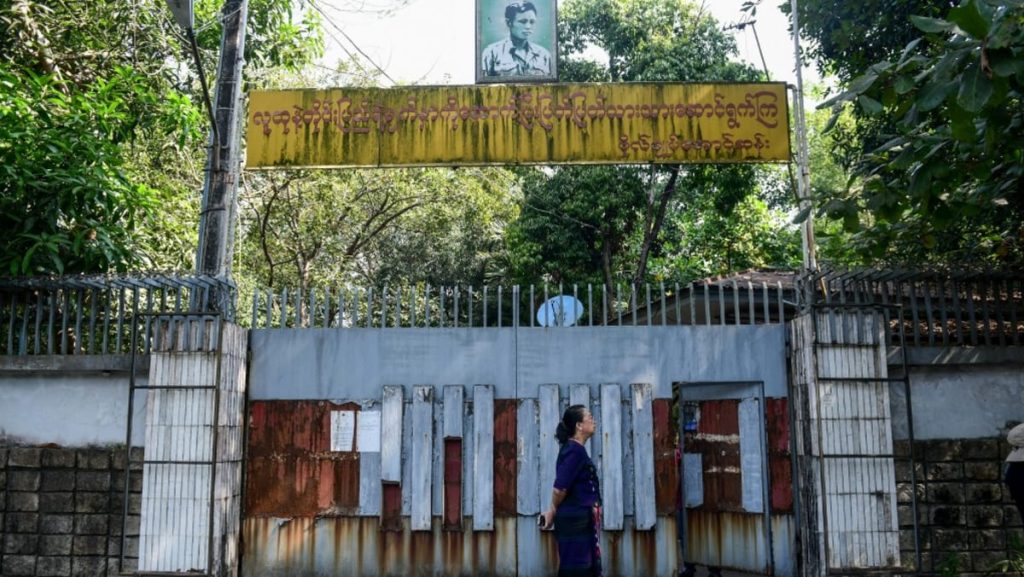The imposing lakeside villa at 54 University Avenue in Yangon, Myanmar, stands as a silent testament to the tumultuous political landscape of the nation. Once the symbol of democratic resistance and hope, the dilapidated property, rumored to be on the market for an exorbitant US$140 million, now reflects the economic devastation wrought by the 2021 military coup. This astronomical asking price, drastically exceeding the estimated US$1-2 million market value for comparable properties in upscale Yangon, raises questions about the potential buyer in a nation crippled by conflict and economic sanctions. The very existence of such a buyer in present-day Myanmar seems paradoxical, given the widespread poverty and economic instability. This discrepancy underscores the deep inequalities and power imbalances that characterize the country’s current situation. The property’s exorbitant price tag becomes even more perplexing when considering its deteriorating condition, further fueling speculation about the motivations behind the sale and the identity of the potential purchaser.
The historical significance of 54 University Avenue transcends its current state of disrepair. For fifteen years, it served as the prison of Aung San Suu Kyi, the Nobel Peace Prize laureate and icon of Myanmar’s pro-democracy movement. Her confinement within those crumbling walls, following her rise to prominence during the 1988 uprisings, transformed the villa into a focal point for both national and international attention. While physically separated from her family in England, Aung San Suu Kyi’s spirit remained unbroken. She nurtured her intellect and resolve by immersing herself in literature, music, and meditation. These practices not only sustained her through years of isolation but also contributed to the solidification of her image as a resilient and principled leader, further amplifying her global influence. The villa’s walls, though confining, could not contain the power of her ideas, which continued to resonate with the people of Myanmar and the international community.
The pavement outside 54 University Avenue became a gathering place for hundreds of supporters eager to hear Aung San Suu Kyi’s messages of democracy and non-violent resistance against military rule. These gatherings transformed the street into a symbol of defiance and hope, a testament to the unwavering belief in a democratic future for Myanmar. The villa, initially intended to isolate and silence her, paradoxically amplified her voice and strengthened her connection with the people. This period of confinement, though undoubtedly challenging, ultimately solidified her role as a beacon of hope for a nation yearning for freedom.
Following her release in 2010, 54 University Avenue transitioned from a symbol of confinement to a hub of international diplomacy. Aung San Suu Kyi continued to reside in the villa, welcoming a stream of dignitaries, including then-US President Barack Obama, journalists, and diplomats. These visits underscored her international stature and the global recognition of her role in Myanmar’s struggle for democracy. The villa became a stage for discussions about human rights, political reform, and the future of Myanmar, further solidifying its significance in the country’s political narrative. This period marked a shift in the villa’s symbolism, from a place of confinement to a symbol of international engagement and hope for a more democratic future.
The current political landscape of Myanmar contrasts starkly with the optimism that followed Aung San Suu Kyi’s release. The 2021 military coup, which abruptly ended a decade of fragile democratic progress, has once again plunged the nation into turmoil. Aung San Suu Kyi, now 79, finds herself once more imprisoned, facing a 27-year sentence on a litany of charges ranging from corruption to violating COVID-19 restrictions. Human rights organizations widely denounce these charges as fabricated and politically motivated, designed to permanently silence her and eliminate her from the political arena. The irony is palpable: the woman who once symbolized hope for a democratic Myanmar is now a political prisoner, her voice silenced by the same forces she dedicated her life to opposing.
The rumored sale of 54 University Avenue, with its exorbitant price tag and uncertain buyer, raises numerous questions about the future of this historically significant property. In a nation grappling with economic collapse and widespread human rights abuses, the fate of the villa hangs in the balance, mirroring the uncertain future of Myanmar itself. Will it become a symbol of the junta’s power and disregard for the nation’s history, or will it eventually reclaim its place as a testament to the enduring struggle for democracy and the unwavering spirit of Aung San Suu Kyi? The answer remains elusive, shrouded in the complexities of Myanmar’s ongoing political crisis.

